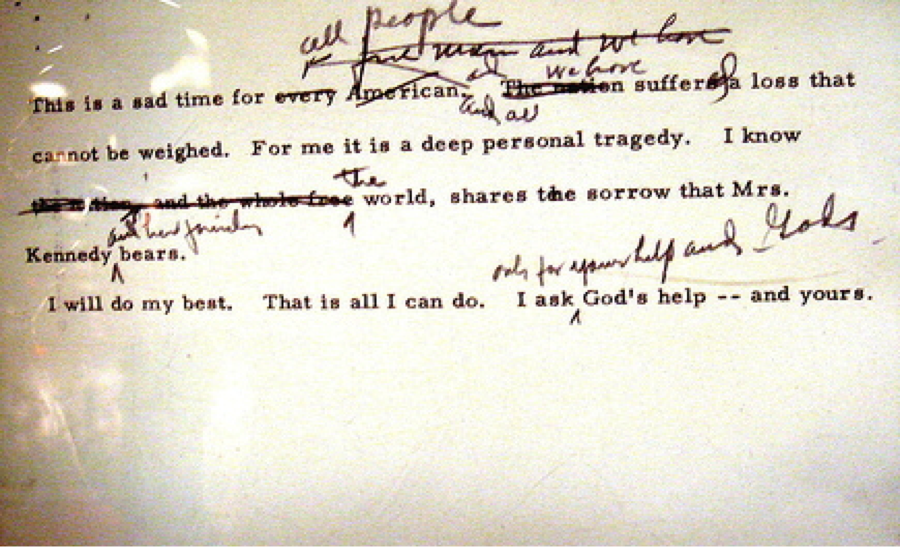Editor-in-Chief
I used to say terrible things about Lyndon Baines Johnson – mainly because I saw him only through the filter of Vietnam. The more I learn about him, the more I see him as one of our truly great presidents.
That view was enlarged recently when I took some time out from SXSW to visit the LBJ Presidential Library in Austin, Texas. Whoever designed the exhibits made a very smart storytelling decision: instead of focusing solely on LBJ, the exhibits tell the story of the early 1960s, framing Johnson’s role in that context.
For anyone interested in that time period (and who isn’t?) it’s very compelling—even if you have only a passing interest in Johnson’s presidency. As we all know, every second at SXSW is precious, and yet a friend and I took several hours away from the music to see the displays.
One of them in particular appealed to the editor in me. It’s a copy of Johnson’s first statement after Kennedy was shot, complete with LBJ’s handwritten edits. The statement was delivered on live TV at Andrews Air Force Base less than four hours after Kennedy died.

As I stood there looking at this piece of history, I was struck by how smart Johnson’s edits were – especially since they were done under intense pressure during the most chaotic circumstances imaginable.
“This is a sad time for every American” became “This is a sad time for all people.” Much better. More than anything at this crucial moment, Johnson needed to show the world – not just America – that he was in charge. This simple change let him speak for “all people,” putting him firmly on the world stage.
He also changed, “I know the nation and the whole free world shares the sorrow Mrs. Kennedy bears.” The term “free world” introduced politics where it didn’t belong, and the line left out the Kennedy family. So LBJ revised it to “I know the world shares the sorrow that Mrs. Kennedy and her family bear.” Shorter, but at the same time more inclusive.
And look how he landed the last sentence. The original was, “I ask for God’s help – and yours.” Good on paper, but when spoken the pronoun “yours” would trail off. LBJ, a consummate politician, surely heard that weak ending in his head. His version, “I ask only for your help, and God’s,” has real power. Impressive.
I think about that a lot in my own writing. When you’re going for impact, keep it short and put the strongest word last.
(And for the grammarians among us, a bonus point: Note how LBJ put “only” in the right place, after the verb. I’m not sure how many politicians could do that today.)
